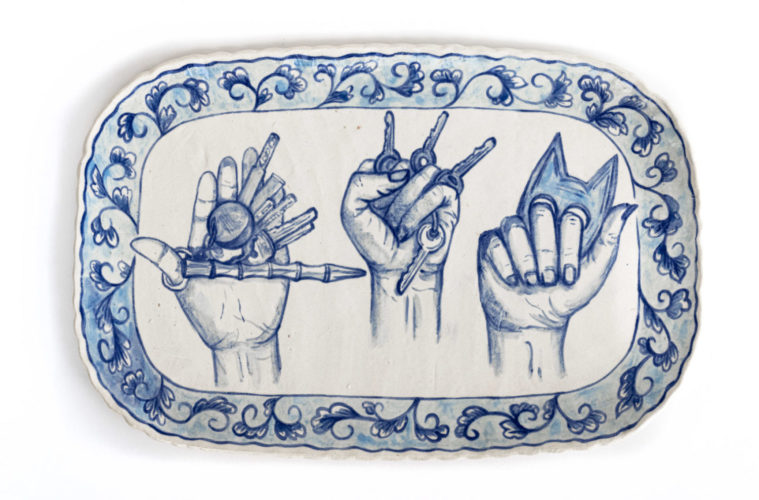Painter and sculptor Elyse Pignolet’s current exhibition I’m Not Like the Other Girls takes on patronizing tropes of beauty and misogyny, moving her signature project of text- and symbol-rich hand-decorated porcelain in impactful new directions. Her particular gift is to deploy an embodied visual strategy of prettiness and luxury to instead discuss the pernicious, persistent, ubiquitous and even internalized language of violence, dismissiveness and control that women continue to face in society. The result is both delightful and difficult, even as the relatability and familiarity of her anecdotes form an indictment of our culture.
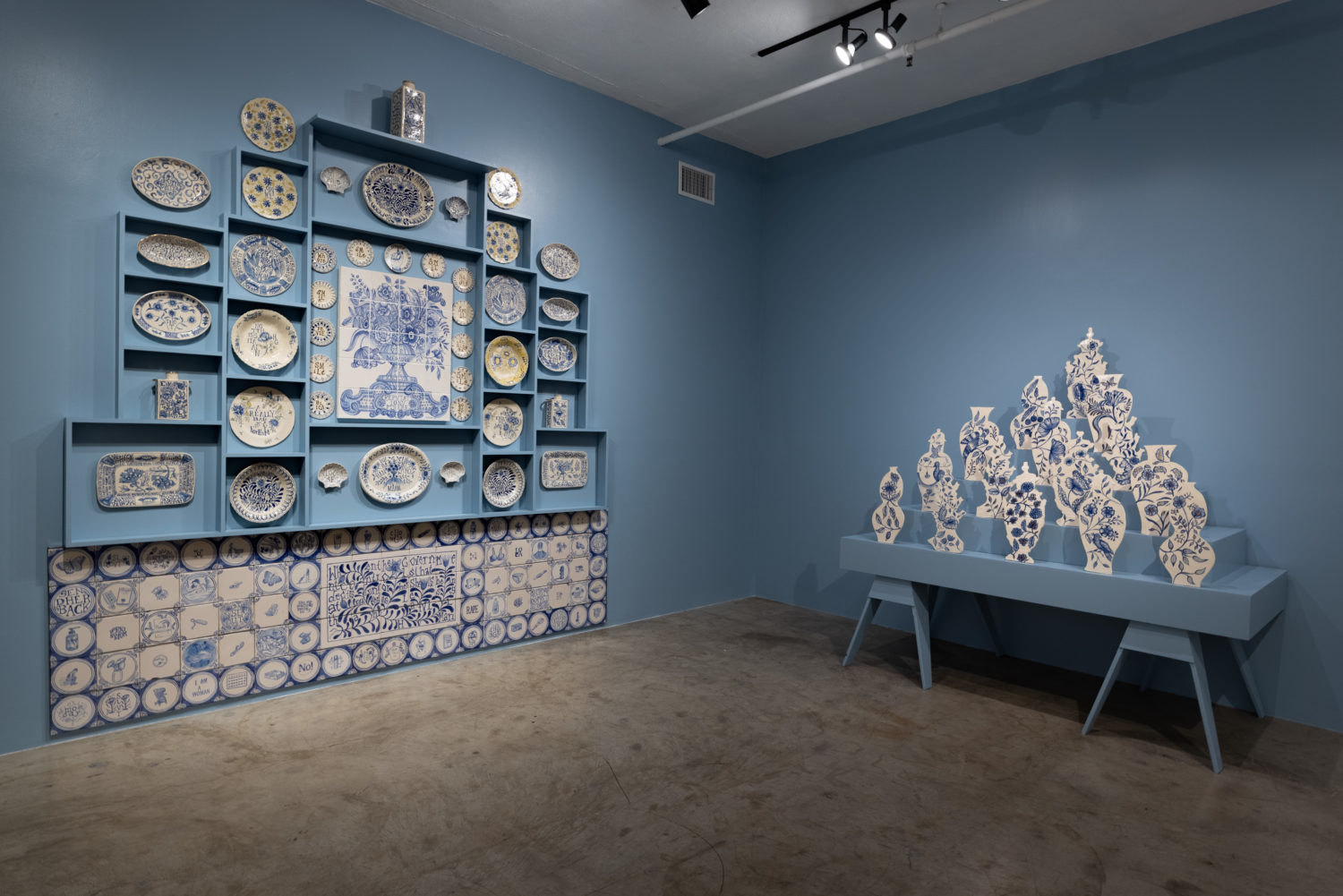
Elyse Pignolet, installation view at Track 16
In previous series, Pignolet has taken on universal instances, common slang and documented facts as to disparities in how we treat women — young, old, of color, in politics, in popular culture — and in the current work she continues to do so. A series of watercolor/sumi ink on paper drawings present variations on the image of a highly decorative porcelain vase holding flowers, each vase sporting a word or phrase that disrupts the pleasure.
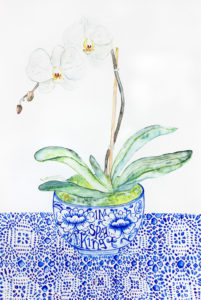
Elyse Pignolet: I’m Speaking, 2021. Cold pressed cotton rag paper with archival pigments, 18 x 12 inches (Courtesy of Track 16)
For example, “I’m Speaking” is a reference to Vice President Kamala Harris’ pushback against being repeatedly interrupted in the campaign debates. That moment remains as instantly recognizable, at least to women who follow politics, as was Trump’s attempted weaponizing of “Nasty Woman,” a phrase which also appears in other works. On the regal ceramic vessel Declaration of Rights and Sentiments (Trump), Pignolet has transcribed a foundational text of the women’s suffrage movement alongside his screed against women who dare challenge him.
At the same time, with this new work from 2020 and 2021, Pignolet not only expands her central ceramics and painting/drawing foundation to include etched mirrors reading “Bitches” and “Exotic AF” as well as a new wallpaper installation, she also gets more personal with the narratives. The exhibition’s monumental central installation Second Sex, made up of scores of individual plates, tiles and vessels, centers on a casual but cutting conversation with her father about her “reputation” in a dynamic that can be described as pushback against her independence and rebellion against orderly traditions.
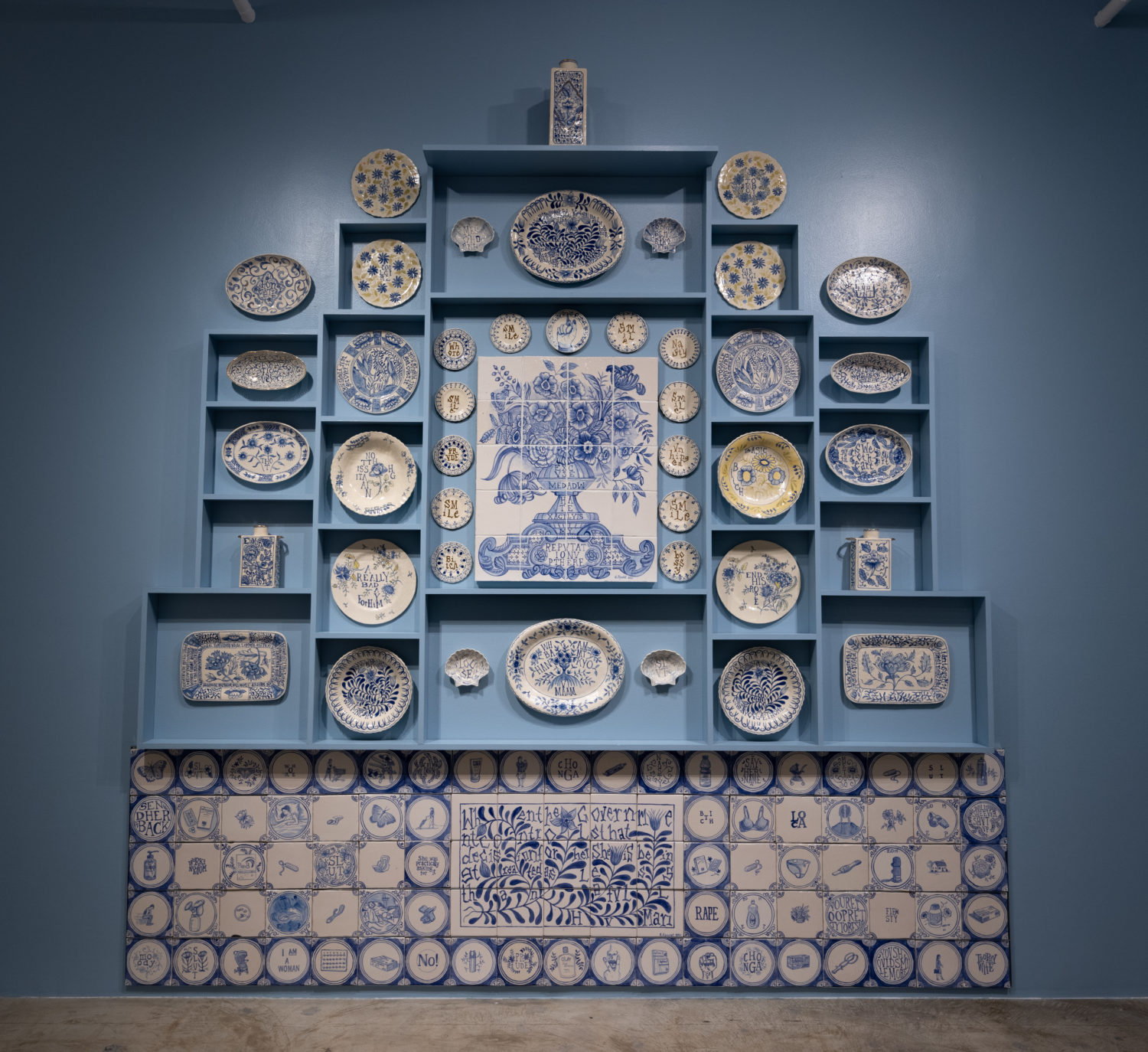
Elyse Pignolet: Second Sex (main installation), 2021. Installation of ceramics and handmade tile with glazes and gold luster, 126 x 119.5 x 7 inches (Courtesy of Track 16)
Personal in another way, her own Filipino heritage — and therefore that of her children — prompted her to further explore the overall dynamic of misogyny through a more focused lens on how Asian women are both fetishized and devalued. One sculpture takes the shape of a pagoda; among its decorative motifs comes the tired, triggering and somehow still current slur, “Me love you long time.” This kind of nonsense still being in cultural currency offers just some of the toxic context for the Atlanta spa shootings of March 2021 in which Asian women were the particular target of the killer.
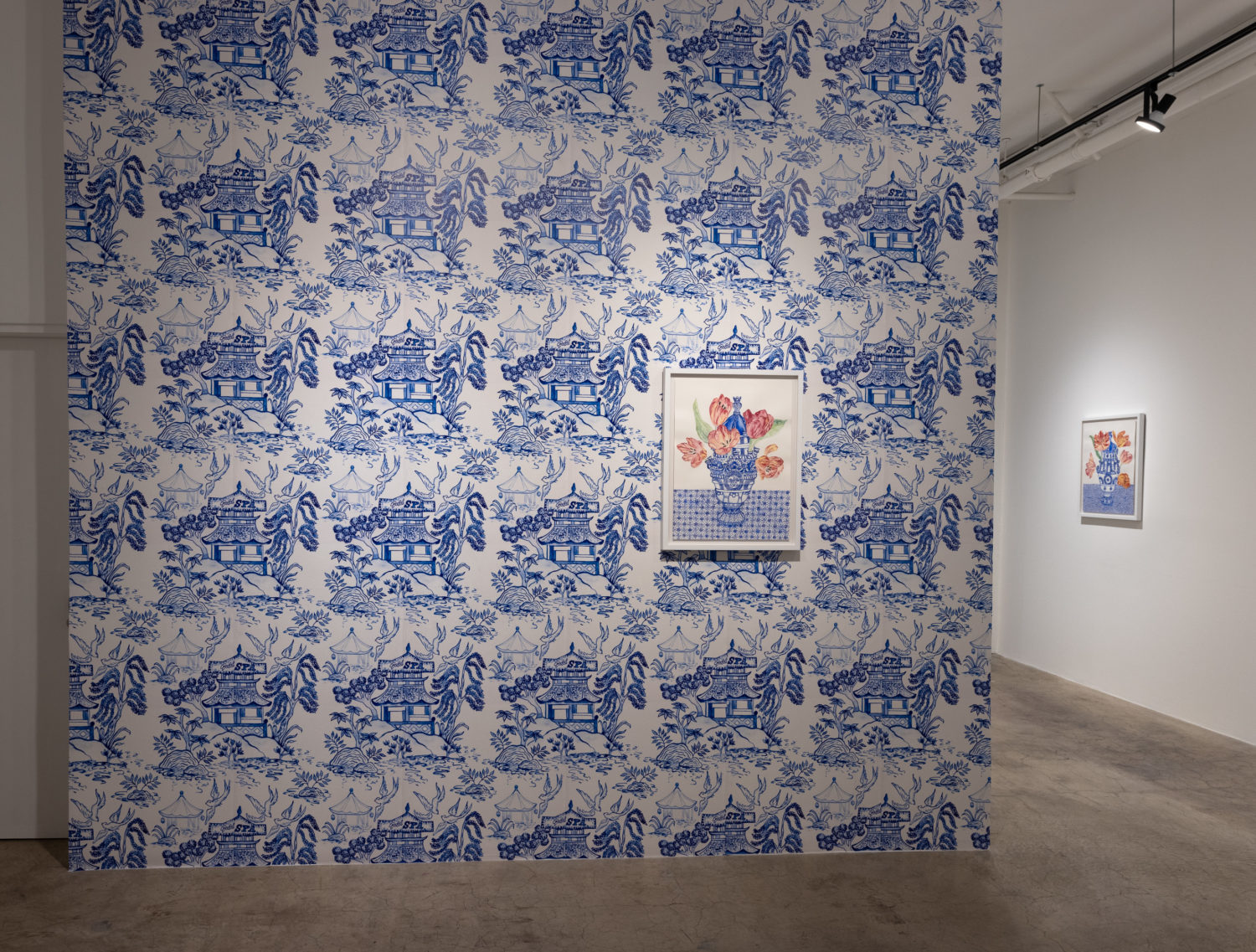
Elyse Pignolet installation view at Track 16
This episode forms the basis both for the wallpaper edition The Gold Spa which is based on widely circulated decorative imagery from the early days of the porcelain market, and for one of the more unsettling plate pieces, A Really Bad Day for Him — a reference to law enforcement’s attitude toward the spree killer in question. He kills eight people, six of whom were women, and the cops direct all their empathy toward him, not the victims nor their families. Because it seems that the police, as avatars of the white patriarchy, find it easier to relate to the killer as a human being than to his victims.
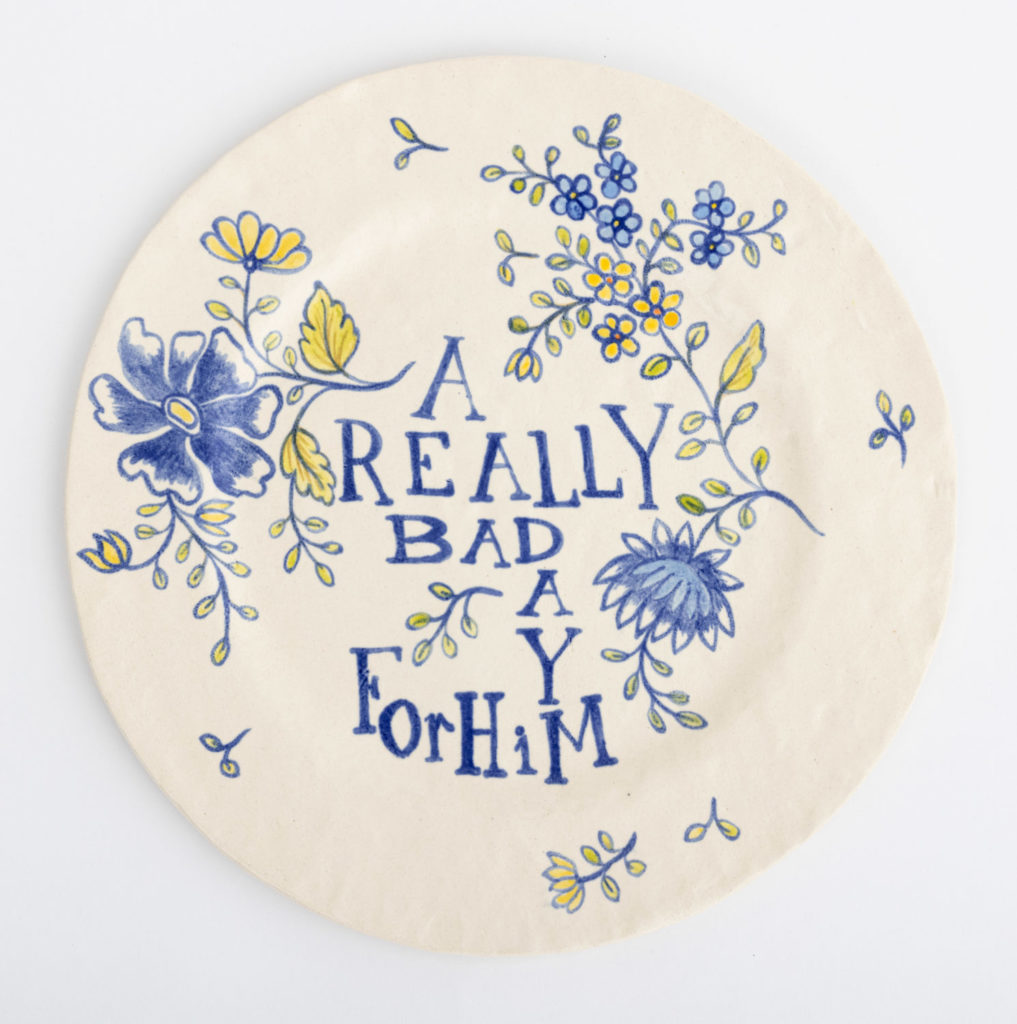
Elyse Pignolet: A Really Bad Day For Him, 2021. Ceramic with glazes, 12 x 12 inches (Courtesy of Track 16)
The exhibition is, however, not without moments of something approaching levity, in a laugh-to-keep-from-crying way more than an outright joking way perhaps, but still, a high-end looking painted tile with a tampon on it is pretty funny. A gorgeous yellow bowl that proudly proclaims “Basic Bitch” is something hundreds of women I know would absolutely own — the rather disgusting origins of the word and its demeaning usages notwithstanding, “bitch” is a word that has been at least partially reclaimed. But then we have to ask ourselves if that is a good thing? There’s satisfaction in owning the language of the oppressor and deflating its power to wound, but it also normalizes that language. A sort of altar to the Free Britney movement asks similar questions about all of our complicity in the singer’s early exploitation, including and in a way especially other women who went along with the treatment.
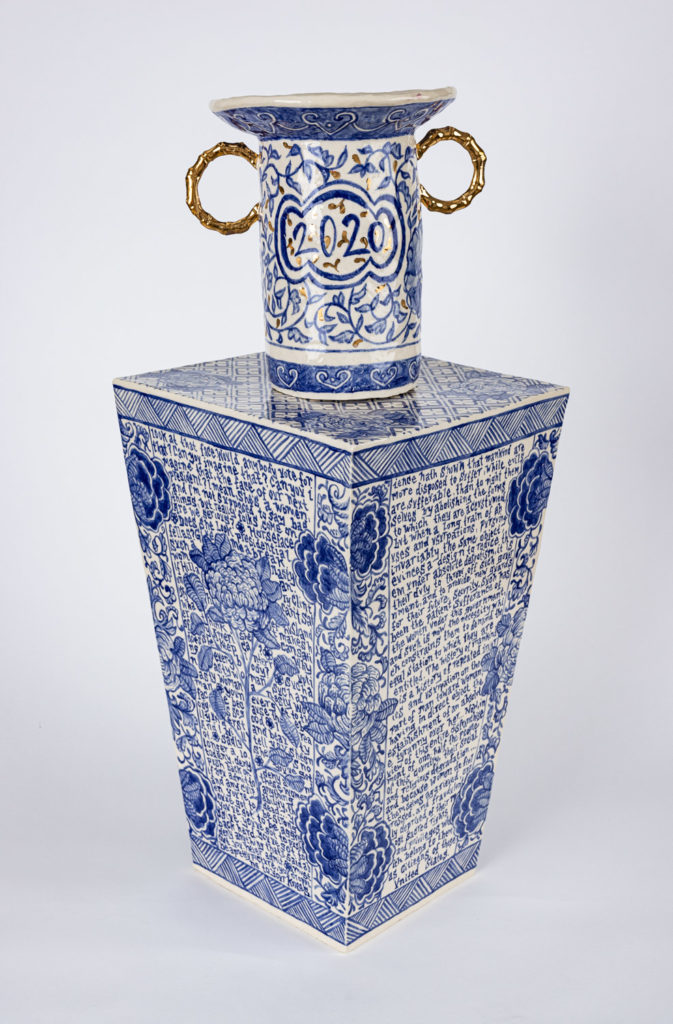
Elyse Pignolet: Declaration of Rights and Sentiments (Trump), 2020. Two-piece stacked ceramic vase with glazes and gold luster, 29 x 11 x 11.5 inches (Courtesy of Track 16
In the end, this kind of paradox which unfolds in reverberations between beauty and brutalization across grand gestures and in a million tiny moments is exactly where the power of Pignolet’s work comes from. The inevitable sting of the disturbing truths that the work proclaims is set up and amplified by the lull of its aesthetic pleasures.
On view through November 20 at Track 16 Gallery in the Bendix Building, 1206 Maple Ave., #1005, downtown; free, limited-capacity artist walkthroughs are available by rsvp on November 2, 3 and 7; track16.com.
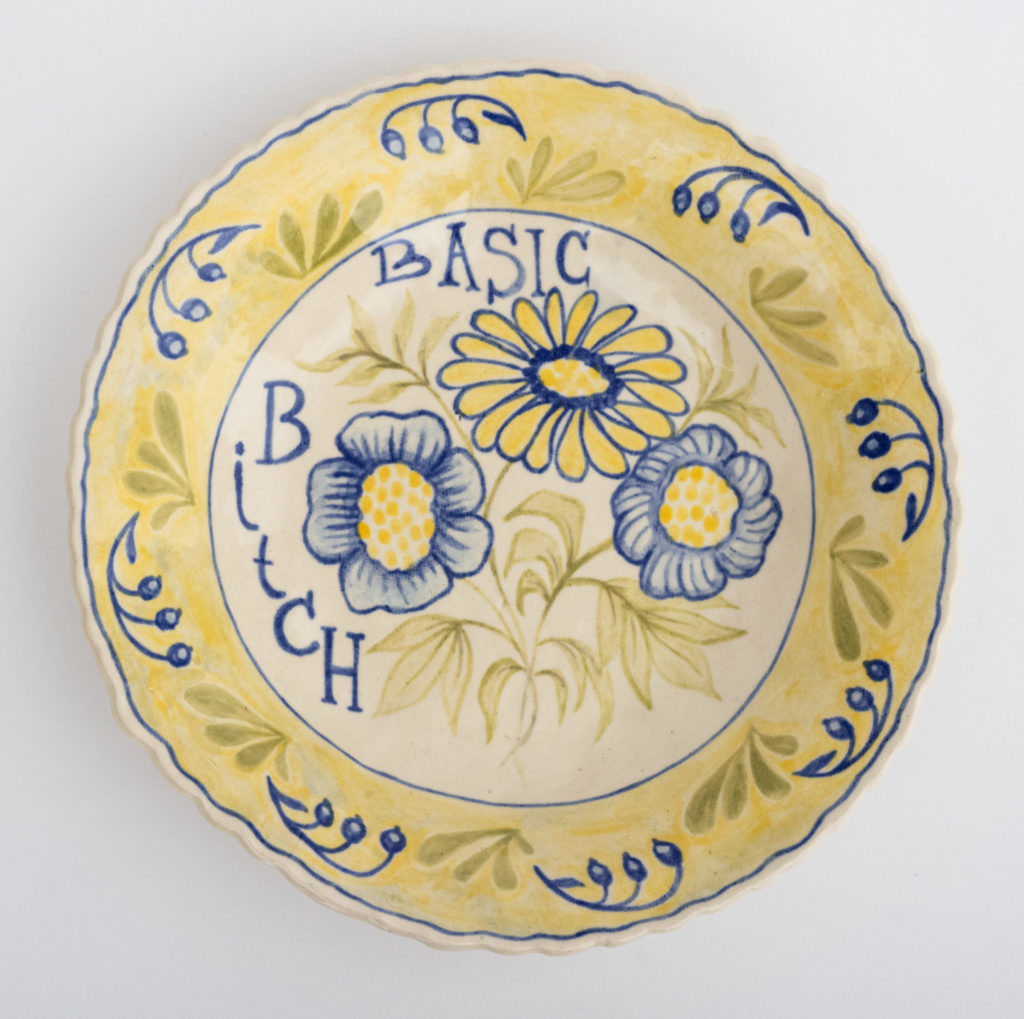
Elyse Pignolet: Basic Bitch, 2021. Ceramic with glazes, 12 x 12 x 1.75 inches (Courtesy of Track 16)

Elyse Pignolet: tiles from Second Sex (detail)
Advertising disclosure: We may receive compensation for some of the links in our stories. Thank you for supporting LA Weekly and our advertisers.

